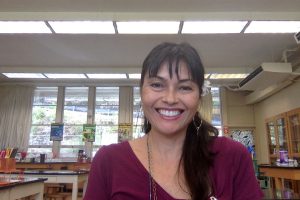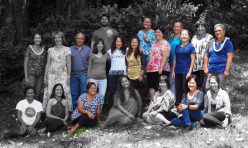Kamehameha Elementary School
Grade 5 Science
Mrs. Malu Kamanu
2019-2020
OVERVIEW
What is science? This was the first question I posed to the haumāna at the start of the school year. “Discovery”, “Experiments”, “Nature”, “Mystery”, and “STEM”, were some of answers I received. Yes to all of the above and more! This year we will be conducting a plethora of investigations covering the various branches of science (see content below). In addition, we will strive to make connections to our ‘Ike kūpuna (ancestral knowledge) and to the honua (world). We will journey in our E Ola! Learner Outcomes of Growth Mindset, Academic Competence, Problem Solving, and Innovation and Creativity.

SCHEDULE
Science is taught in two semesters in 5th grade. Grades are given at the end of each semester. Haumāna come to science class once every 6 day cycle, which translates to them receiving approximately 10 instructional days per sememster. Therefore, it is essential that students come in to see me if they have been absent.
SCIENCE CONTENT/UNITS
This year, the haumāna will get a taste of the various branches of science, including Life Sciences, Physical Sciences, Earth/Space Sciences, and Core Ideas in Technology and Applications of Science. I will be using the Next Generation Science Standards, The Full Option Science System (FOSS) curriculum, and Kamehameha Schools curriculum, particularly focusing on planning and carrying out investigations AND analyzing and interpreting data. First Semester:
• Food and Nutrition Students investigate the essential question: How does food provide energy and nutrients for growth and development? Students become aware of carbohydrates, proteins, fats, and vitamins as components of food. In depth, they focus on fats in the human diet and conduct a fat investigation comparing fat content in various foods.
• Earth and Space Science Students investigate the essential question: What can be learned from the night (and day) sky? How do those “learnings” affect my life here, where I am? Students will investigate why some things move in the night sky and some remain constant. They will focus on the “life” cycle of stars, our solar system, and our ʻike kūpuna on astronomy.
WHAT IF MY CHILD NEEDS HELP OR IS ABSENT?
Science lab is open each day at first recess or afterschool. I am often on campus early in the morning setting up for my first lab (as another possibility). If you have any questions or concerns, I may be reached at cakamanu@ksbe.edu.


